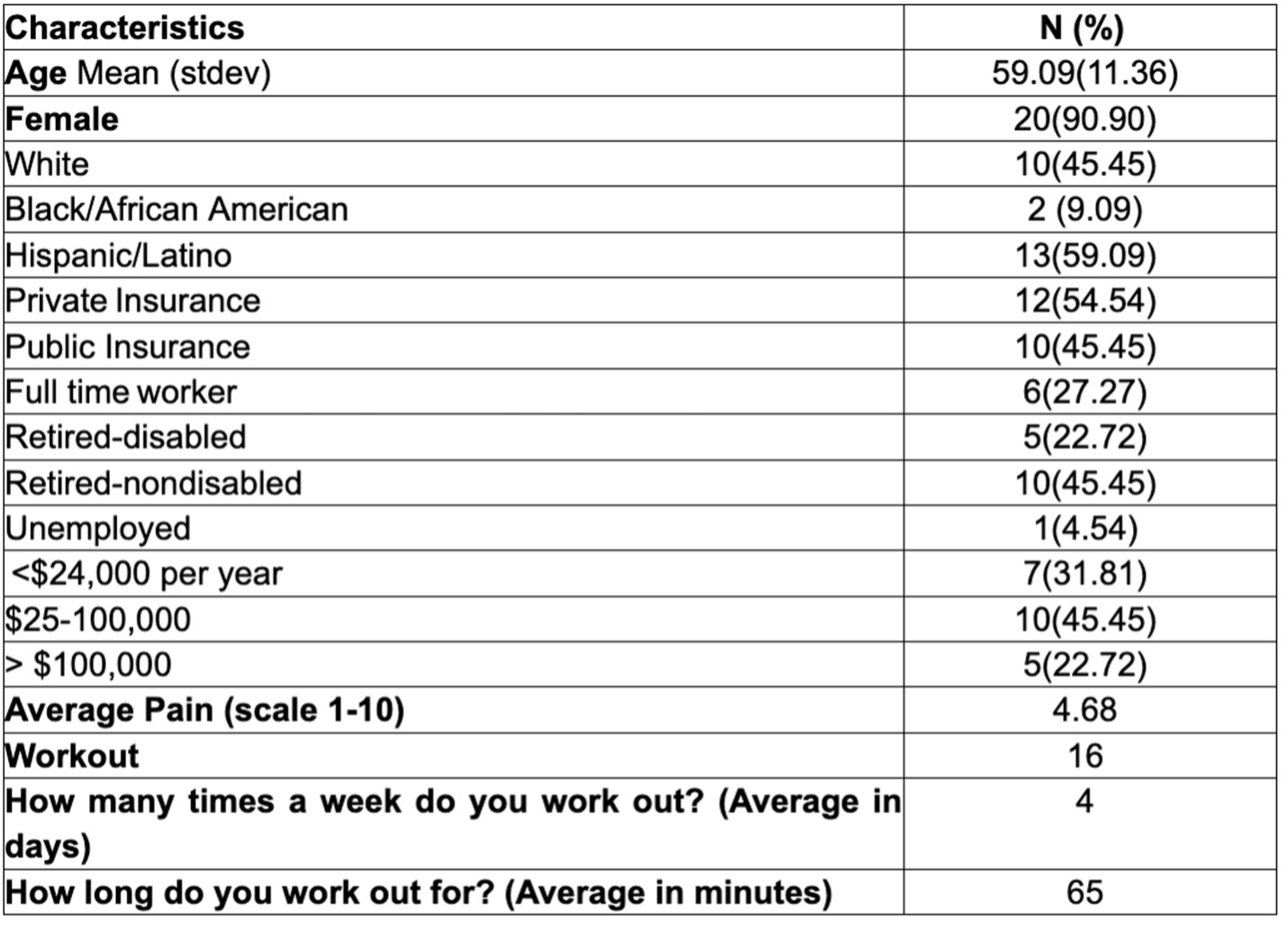Session Information
Date: Monday, October 27, 2025
Title: (1248–1271) Patient Outcomes, Preferences, & Attitudes Poster II
Session Type: Poster Session B
Session Time: 10:30AM-12:30PM
Background/Purpose: Approximately 1.3 million Americans have rheumatoid arthritis (RA)1. Up to 83% of people with chronic pain, the hallmark symptom of RA also experience anxiety and/or depression2-5. Peer coaches, lay individuals who themselves live with the same chronic condition, can be particularly effective at addressing these challenges in people with diabetes and post-partum depression. The purpose of this study was to involve people with RA (PWRA) to inform the adaptation of a proven, effective peer coaching intervention to the context of RA, considering the needs of diverse populations and soliciting input about mental health and physical activity.
Methods: We conducted semi-structured interviews via teleconference using a topic guide that was informed by Social Cognitive Theory, to elicit the mental and physical experiences of PWRA. Inclusion criteria were: 1) PWRA 18 > years of age, 2) Severe pain interfering significantly with performing activities of daily living over the last 2 weeks, 3) Access to the internet and/or phone, 4) Living in the US including Puerto Rico, and 5) English or Spanish speakers. The topic guide focused on barriers and facilitators related to disease management, mental health, physical activity, and opinions about working with a peer coach (another PWRA trained to coach another PWRA in specific evidence-based health behaviors). Data were analyzed thematically with NVivo software by two independent analysts, highlighting Puerto Rican and Mainland voices.
Results: Of 22 participants, 20 were women, most were >50 years of age, and 5 were residents of Puerto Rico (Image 1). Images 2 and 3 shows the six themes that emerged: (1) Ableism and isolationism: Participants felt a strong sense of separation from their peers without RA; (2) Grief of former self: Many grieved the loss of abilities they had prior to their RA diagnosis, feeling inadequate in tasks they were once self-sufficient at; (3) Resilience: Participants exhibited resilience, adapting their physical and social environments to better support their needs and improve their quality of life; (4) Adaptation of physical activities: Participants emphasized adapting physical activities without causing further injury; (5) Sleep: Participants described challenges with sleep quality that impacted their physical and emotional well-being; and (6) Perception of working with a peer coach: participants valued the guidance of someone with shared experience, who could provide insights into managing pain and mental health.
Conclusion: PWRA identified several barriers (isolationism, ableism, grief, sleep difficulty) and facilitators (resilience, adaptation) that hold potential for improving mental health and physical activity in this population. This could potentially be achieved by having peer coaches assist in behavioral changes and “breaking the veil” of silence and invisibility through role-modeling behaviors and assisting PWRA to cope with challenges related to living with RA. Further interventions should continue to explore similarities and differences between Puerto Rican and Mainland participants to better tailor RA services to diverse populations.
 Image 1: Demographic Characteristics and Exercise Habits of 22 Participants with RA
Image 1: Demographic Characteristics and Exercise Habits of 22 Participants with RA
.jpg) Image 2: Themes and corresponding quotes from Mainland and Puerto Rican participants
Image 2: Themes and corresponding quotes from Mainland and Puerto Rican participants
.jpg) Image 3: Themes and corresponding quotes from Mainland and Puerto Rican participants
Image 3: Themes and corresponding quotes from Mainland and Puerto Rican participants
To cite this abstract in AMA style:
Garcia D, Madrigal V, Hernandez N, Akinsete A, Navarro-Millan I, Vazquez Otero I, Gonzalez Melendez A, Young S, Safford M. Breaking the Veil: Preliminary Findings for a Qualitative Analysis of Rheumatoid Arthritis Patient Perspectives on Physical Activity and Mental Healt [abstract]. Arthritis Rheumatol. 2025; 77 (suppl 9). https://acrabstracts.org/abstract/breaking-the-veil-preliminary-findings-for-a-qualitative-analysis-of-rheumatoid-arthritis-patient-perspectives-on-physical-activity-and-mental-healt/. Accessed .« Back to ACR Convergence 2025
ACR Meeting Abstracts - https://acrabstracts.org/abstract/breaking-the-veil-preliminary-findings-for-a-qualitative-analysis-of-rheumatoid-arthritis-patient-perspectives-on-physical-activity-and-mental-healt/
